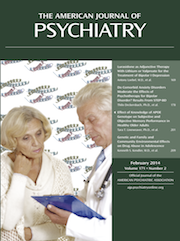Pharmacological Treatments of Non-Substance-Withdrawal Delirium: A Systematic Review of Prospective Trials
Abstract
Objective
Most reviews of pharmacological strategies for delirium treatment evaluate the effectiveness of these interventions for delirium prevention, reduction in duration and severity of ongoing delirium, and other outcomes that extend beyond the recommendations of expert treatment guidelines. However, little if any attention is given to substantiating the potential benefits of such treatment or addressing the methodological weaknesses that, in part, limit the pharmacological recommendations made by expert treatment guidelines. Therefore, the authors conducted a systematic review to provide the most up-to-date and inclusive review of published prospective trials of potential pharmacological interventions for the prevention and treatment of delirium, and they discuss potential benefits of pharmacological prevention of delirium and/or reduction of ongoing delirium episode duration and severity.
Method
The analysis followed Preferred Reporting Items for Systematic Reviews and Meta-Analyses (PRISMA) guidelines, including prospective randomized and nonrandomized double-blind, single-blind, and open-label clinical trials of any pharmacological agent for the prevention or treatment of delirium and reviewing them systematically for effectiveness on several predefined outcomes.
Results
The pharmacological strategies reviewed showed greater success in preventing delirium than in treating it. Significant delirium prevention effects are associated with haloperidol, second-generation antipsychotics, iliac fascia block, gabapentin, melatonin, lower levels of intraoperative propofol sedation, and a single dose of ketamine during anesthetic induction and with dexmedetomidine compared with other sedation strategies for mechanically ventilated patients.
Conclusions
These promising results warrant further study with consideration of the methodological weaknesses and inconsistencies of studies to date.



